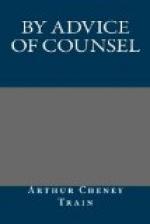“Gentlemen,” he said quietly, “the defense is very simple. None of the witnesses who have appeared here was in fact present at the scene of the homicide at all. I shall call some ten or twelve reputable Syrian citizens who will prove to you that Kasheed Hassoun, my client, with a large party of friends was sitting quietly in the restaurant when Sardi Babu came in with a revolver in his hand, which he fired at Hassoun, and that then, and only then, a small dark man whose identity cannot be established—evidently a stranger—seized Babu before he could fire again, and killed him—in self-defense.”
Mr. William Montague Pepperill’s jaw dropped as if he had seen the ghost of one of his colonial ancestors. He could not believe that he had heard Mr. Tutt correctly. Why, the old lawyer had the thing completely turned round! Sardi Babu hadn’t gone to the restaurant. He had been in the restaurant, and it had been Kasheed Hassoun who had gone there.
Yet, one by one, placidly, imperturbably, the dozen witnesses foretold by Mr. Tutt, and gathered in by Bonnie Doon, marched to the chair and swore upon the Holy Bible that it was even as Mr. Tutt had said, and that no such persons as Mokarzel, Kahoots, Abbu, Shikrie and Elias had been in the restaurant at any time that evening, but on the contrary that they, the friends of Hassoun, had been there eating Turkish pie—a few might have had mashed beans with taheenak—when Sardi Babu, apparently with suicidal intent, entered alone to take vengeance upon the camel owner.
“That is all. That is our case,” said Mr. Tutt as the last Syrian left the stand.
But there was no response from the bench. Judge Wetherell had been dozing peacefully for several hours. Even Pepperill could not avoid a decorous smile. Then the clerk pulled out the copy of Al-Hoda and rustled it, and His Honor, who had been dreaming that he was riding through the narrow streets of Bagdad upon a jerky white dromedary so tall that he could peek through the latticed balconies at the plump, black-eyed odalisques within the harems, slowly came back from Turkey to New York.
“Gentlemen of the jury,” said he, pulling himself together, “the defendant here is charged by the Grand Jury with having murdered Fatima the daughter of Abbas—I beg your pardon! I mean—who was it?—one Sardi Babu. I will first define to you the degrees of homicide—”
* * * * *
One day three months later, after Kasheed Hassoun had been twice tried upon the same testimony and the jury had disagreed—six to six, each time—Mr. Tutt, who had overstayed his lunch hour at the office, put on his stovepipe hat and strolled along Washington Street, looking for a place to pick up a bite to eat. It was in the middle of the afternoon and most of the stores were empty, which was all the more to his liking. He had always wanted to try some of that Turkish pie that they had all talked so much about at the trial. Presently a familiar juxtaposition of names caught his eye—Ghabryel & Assad. The very restaurant which had been the scene of the crime! Curiously, he turned in there. Like all the other places it was deserted, but at the sound of his footsteps a little Syrian boy not more than ten years old came from behind the screen at the end of the room and stood bashfully awaiting his order.




